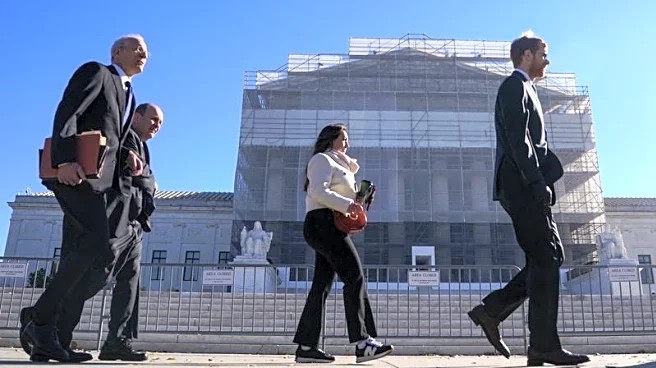By John Kruzel
WASHINGTON (Reuters) -After the U.S. Supreme Court used a conservative legal principle called the "major questions" doctrine to blow holes in Democratic former President Joe Biden's agenda,
will Republican President Donald Trump's sweeping tariffs suffer the same fate?
That is a key question as the court decides the legality of tariffs that are central to Trump's economic policy and how he deals with the rest of the world. The court heard arguments in the case on Wednesday, and the major questions doctrine was a focal point as the justices questioned the lawyers representing the Trump administration and the parties who have challenged the tariffs as an overreach of presidential power.
The court has a 6-3 conservative majority. Its conservative justices in recent years have embraced this doctrine, which requires executive branch actions of "vast economic and political significance" to be clearly authorized by Congress.
BIDEN'S POLICIES
The court cited the doctrine to stymie Biden's plan to cancel $430 billion in student debt, block his COVID-19 vaccination-or-testing mandate for large businesses, undo his policy shielding cash-strapped renters from eviction during the pandemic and roll back the Environmental Protection Agency's authority to regulate carbon pollution from power plants.
In the tariffs case, it remains to be seen how the court rules and whether the major questions doctrine will guide its decision. But most of the justices signaled at least some concerns about the legality of Trump's imposition of the tariffs under a 1977 law meant for use in national emergencies.
Congress passed the International Emergency Economic Powers Act, or IEEPA, to enhance the president's powers during a national emergency. While the statute authorizes a president to regulate importation, it does not contain the word tariff. Prior to Trump, no president had used IEEPA to impose tariffs.
U.S. Solicitor General D. John Sauer, representing Trump's administration, faced resistance when he suggested during the arguments that the major questions doctrine should not apply to Trump's tariffs, citing presidential authority in the realm of foreign affairs.
"I mean, it seems that it might be directly applicable," conservative Chief Justice John Roberts told Sauer, referring to the doctrine.
"The justification is being used for a power to impose tariffs on any product, from any country, in any amount, for any length of time," Roberts added. "I'm not suggesting it's not there, but it does seem like that's major authority, and the basis for that claim seems to be a misfit."
'AN EMBARRASSMENT'
The court runs the risk of appearing deeply partisan if it declines to scrutinize Trump's tariffs under this doctrine, according to Corey Brettschneider, a Brown University professor who teaches courses on constitutional law.
"They used it to constrain Biden, so why would they not use it here?" Brettschneider asked. "That would be an embarrassment for the court."
Among the six conservative justices, Roberts appeared the most clearly inclined to rule against Trump's tariffs based on the major questions doctrine. Conservative Justices Neil Gorsuch and Amy Coney Barrett, along with the court's three liberal members, also appeared dubious of the legal soundness of Trump's tariffs.
Albany Law School professor Raymond Brescia said that ambiguity around IEEPA's scope should prompt the court to apply the major questions doctrine, just as it did in Biden's student loan case, and strike down Trump's tariffs.
"That it is hard to say whether the court will even adhere to its prior rulings speaks volumes about what many court watchers think about whether one should ever bet against the Trump administration before this court," Brescia said.
The court has issued decisions on an emergency basis in a series of cases this year allowing various Trump policies to go into effect after lower courts raised questions about their legality.
FORMALIZING THE DOCTRINE
The Supreme Court's conservatives formalized the major questions doctrine during Biden's four years as president, finding that some of his key executive actions lacked clear congressional authorization.
These rulings were cited by challengers to Trump's tariffs. Businesses affected by the tariffs and 12 U.S. states, most of them Democratic-led, sued to block Trump's trade policy. The Trump administration appealed after a federal appeals court and a federal judge ruled against the legality of the tariffs.
The Washington-based U.S. Court of Appeals for the Federal Circuit found "no clear congressional authorization" under IEEPA for tariffs of the magnitude at issue.
"The government's interpretation of IEEPA as providing the president power to impose unlimited tariffs ... runs afoul of the major questions doctrine," it wrote.
Some Trump critics think the justices should embrace that same reasoning in deciding the tariffs case.
"It seems to me if they're going to use a major question on student loans, they should better use it on trillions of dollars of taxes that cross the world," said Democratic Senator Amy Klobuchar, who attended the arguments.
While the Supreme Court typically takes months to issue rulings after hearing arguments, the administration has asked it to act swiftly in this case, though the timing of the decision remains unclear.
Columbia University constitutional law professor Gillian Metzger said that she expects the challengers to prevail.
"If the court invalidates the tariffs, I expect the majority will do so on the ground that tariffs are not authorized by the statute's text, bringing in the major questions doctrine as an additional supportive basis for that holding but not the sole ground," Metzger said.
(Reporting by John Kruzel, Andrew Chung, Jan Wolfe and Blake Brittain; Editing by Will Dunham)










